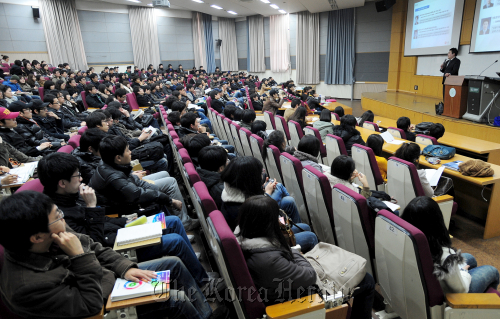Cho Su-hee has been interested in music for as long as she can remember, so when she enrolled at the Catholic University of Korea deciding to aim for the music industry was an easy decision.
However, that was the only easy part about finding employment for Cho, who had to start building her resume as a freshman, and now steps into the world of employment as a senior.
And with recruitment season in full swing, Cho and many other hopeful seniors and graduates see before them a fierce job market ― requiring patience, knowhow, good salesmanship and a little bit of luck.
Choi Yoon-suk, who graduated from Hankuk University of Foreign Studies last semester, is filtering the job market for something in the finance sector, hoping to put his business administration major to good use.
But as much as “the grass is greener in the finance sector,” according to Yoon, the competition is just as fierce despite not going through the normal open recruitment process usually seen here.
“I would say that out of all my friends that are looking for jobs and have graduated out of the same major, only 10 percent actually found one,” said Choi.
“I don’t have any friends at the moment who have a job lined up,” said Cho, who would like to go into performance planning or record promotion.
According to a survey last February by Jobkorea, an online recruiting agency, nearly 60 percent of the 1,158 hopeful graduates questioned are yet to find some form of employment.
Even for kindergarten teachers, entering a field in which employment is abundant, the search can be equally difficult.
“For kindergarten teachers, it is not that difficult to find employment, but you have to find a good position, and that can be the hard part,” said Kim Min-jeong, an early childhood education major at Wonkwang University.
The difficulty in finding jobs is not because there are fewer opportunities.
“The number of employment opportunities has gone up,” said a counselor at Seoul National University’s Career Development Center.
“On the other hand, an increase in the number of applicants, inflation of qualifications, mismatching of employment and other factors might lead to substantial difficulty in employment,” she said.
This can be disheartening for most students, as they prepare for their future well before graduation, rather than a last-minute, senior-year panic.
“I have tried to add to my qualifications ever since I started attending university,” said Cho.
For most students the search for employment usually goes on for months.
Cho has started looking for jobs since December of 2010 and has received numerous call backs, but to no avail.
Kim eventually found employment after three months of searching.
According to the survey, 60 percent of seniors are hopeful that they will find a job within six months of their search.
And Choi is definitely one of the hopefuls.
“I’m more anxious than anything. I’m not angry or anything like that,” said Choi.
 |
Students listen during an employment seminar at Konkuk University early this month. (Yonhap News) |
But just in case, Choi has contingency plans in case he does not find employment by his July deadline.
“If I don’t get a job by July, I will start looking into graduate school, or apply to other fields,” he said.
Oh Gyu-duk, head consultant at Incruit, offered tips and an insider view of what human resource departments are looking for.
“An example of a good applicant is someone who applies according to the type of industry they want to be in and the duty they wish to perform,” Oh said.
According to Oh, a problem that applicants usually face is the mental drain after applying for a couple months, eventually driving them to apply everywhere in a desperate attempt to land a job. But Oh said that the students just need to understand that this is an element that they need to patiently overcome.
And companies are considering applicants that have the right attitude for the workplace culture.
“Companies look for competent individuals who have conviction, passion and an edge toward work, and those who show enough versatility to bend themselves in order to maintain relationships,” said the SNU counselor.
According to the official, interviews are growing increasingly important in order to uncover practical skills, ability to learn, and how well the applicant will conform to their culture.
Many experts agreed that one of the biggest things that companies are looking for is loyalty and longevity.
“Even for a large corporation, the cost of recruiting is tremendously high. It is extremely expensive to hire even just one person,” said Oh.
So companies tend to prefer applicants who express the desire to stay.
“Depending on how one prepares and shows their passion and loyalty for the company has a big effect,” he said, adding that it is apparent in the cover letter or interview.
According to the SNU official, expressing a long term vision for the company is also a major point.
The Seoul National University Career Development Center’s services, like most universities, are available after graduation. Career and individual consulting programs are seeing high participation rates.
By Robert Lee (
rjmlee@heraldcorp.com)








